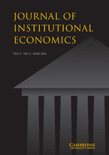
Journal of Institutional Economics
Scope & Guideline
Illuminating the Path of Institutional Analysis
Introduction
Aims and Scopes
- Interdisciplinary Analysis of Institutions:
The journal integrates insights from economics, political science, sociology, and law to provide a comprehensive understanding of how institutions function and evolve. - Focus on Governance and Policy:
It emphasizes the role of governance structures, including formal and informal institutions, in shaping economic policies and outcomes. - Exploration of Economic Freedom:
Research frequently investigates the relationship between economic freedom, institutional quality, and overall economic performance, highlighting how different institutional arrangements affect economic activities. - Cultural and Historical Contexts:
The journal explores how cultural norms and historical legacies influence institutional development and economic behavior across different regions. - Empirical Evidence and Case Studies:
It prioritizes empirical research and case studies that illustrate the practical implications of institutional theories in various contexts, including developing economies.
Trending and Emerging
- Impact of Technology on Institutions:
There is a growing focus on how technological advancements, such as artificial intelligence and blockchain, interact with and reshape institutional frameworks, highlighting the need for adaptive governance in the digital age. - Environmental Governance and Institutions:
Research increasingly addresses the intersection of environmental issues and institutional economics, exploring how governance structures can effectively manage natural resources and address climate change. - Cultural Influences on Institutional Development:
Emerging studies examine the role of culture in shaping economic institutions, emphasizing how cultural norms and values affect governance and economic behaviors. - Political Economy of Globalization:
Recent publications delve into the political economy implications of globalization, particularly how international institutions and trade agreements influence domestic economic policies and institutional quality. - Resilience of Institutions in Crisis Situations:
There is an increasing interest in understanding how institutions respond to crises, such as pandemics or economic shocks, and what factors contribute to institutional resilience and adaptability.
Declining or Waning
- Traditional Neoclassical Economics:
There has been a noticeable decline in articles that strictly adhere to neoclassical economic theories, indicating a shift towards more interdisciplinary approaches that incorporate behavioral and institutional perspectives. - Static Analyses of Institutions:
Research that focuses solely on static analyses of institutions without considering their dynamic evolution or interaction with other variables seems to be less prevalent, reflecting a growing interest in more complex, adaptive institutional frameworks. - Focus on Purely Quantitative Methods:
While quantitative analyses remain important, there appears to be a waning interest in studies that rely exclusively on quantitative methods without integrating qualitative insights, suggesting a broader acceptance of mixed-method approaches. - Overemphasis on Legal Formalism:
Themes strictly centered on legal formalism and rigid institutional frameworks are declining, as scholars increasingly recognize the importance of informal institutions and social norms in shaping economic outcomes. - Historical Institutionalism in Isolation:
Research that examines historical institutionalism in isolation, without connecting it to contemporary issues or interdisciplinary contexts, is becoming less common, indicating a shift towards more integrative analyses.
Similar Journals
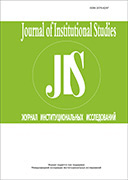
Journal of Institutional Studies
Exploring the dynamics of institutions in society.Journal of Institutional Studies, published by the International Association for Institutional Research, is a premier Open Access journal dedicated to advancing the field of institutional studies. With a commitment to enhancing the accessibility of academic discourse, this journal has been freely available since 2009, thereby promoting the dissemination of knowledge across a global audience. The journal's ISSN is 2076-6297 and it also bears the E-ISSN 2412-6039, ensuring you can find it easily in various academic databases. Despite lacking certain metrics like HIndex and Scopus rankings at present, the Journal of Institutional Studies is pivotal for researchers, professionals, and students interested in exploring the intricate dynamics of institutions in society, policy-making, and governance. By fostering a platform for high-quality research, this journal not only contributes to academic discussions but also influences practice and decision-making within institutions worldwide. We invite you to engage with the valuable insights and research findings presented in this leading journal.

JOURNAL OF EVOLUTIONARY ECONOMICS
Unraveling the complexities of economic systems through evolutionary theory.JOURNAL OF EVOLUTIONARY ECONOMICS, published by SPRINGER, serves as a critical platform for the dissemination of innovative research in the dynamic field of evolutionary economics. With an ISSN of 0936-9937 and an E-ISSN of 1432-1386, this journal has been at the forefront of exploring the intricate relationships between economic systems and evolutionary theory since its inception in 1991. As of 2023, it proudly holds a Q2 ranking in both the Business, Management and Accounting (miscellaneous) and Economics and Econometrics categories, illustrating its significant contribution to these domains. With a Scopus ranking of #260/716 in Economics and Econometrics and #93/218 in General Business, Management and Accounting, JOURNAL OF EVOLUTIONARY ECONOMICS is essential for researchers, professionals, and students keen on understanding the complex interplay of economic evolution and innovation. Although it does not offer Open Access options, its robust impact in shaping economic discourse makes it a vital resource for advancing knowledge and scholarship.

Cliometrica
Illuminating Historical Trends through Quantitative MethodsCliometrica, published by Springer Heidelberg, is a prestigious journal that has made significant contributions to the fields of Economics and Econometrics as well as History. With an impressive 2023 Scopus ranking placing it in the Q2 category for Economics and Econometrics and the Q1 category for History, this journal stands out as an essential resource for researchers, professionals, and students alike. Known for its rigorous scholarly approach, Cliometrica merges quantitative and qualitative methodologies to uncover insights into historical economic analysis, reflecting the interdisciplinary nature of contemporary research. With access strictly through subscription, it continues to uphold high academic standards, making it a vital addition to any academic library. Published in Germany, Cliometrica serves as a key platform for advancing the discussion and understanding of historical econometric techniques, ensuring its relevance and importance in both historical and economic research circles.

JOURNAL OF INSTITUTIONAL AND THEORETICAL ECONOMICS-ZEITSCHRIFT FUR DIE GESAMTE STAATSWISSENSCHAFT
Elevating the conversation in institutional and theoretical economics.JOURNAL OF INSTITUTIONAL AND THEORETICAL ECONOMICS-ZEITSCHRIFT FUR DIE GESAMTE STAATSWISSENSCHAFT is a distinguished publication dedicated to advancing the fields of institutional and theoretical economics. Published by J C B MOHR in Germany, this journal serves as a critical platform for scholarly discourse and research dissemination, encouraging contributions that delve into economic theory and its practical implications in institutional contexts. With an ISSN of 0932-4569 and an E-ISSN of 1614-0559, it enjoys a respectable position, having achieved a Q3 ranking in Economics and Econometrics according to the 2023 categorization. This journal, which bridges theoretical frameworks with real-world applications, is vital for researchers, practitioners, and students seeking to deepen their understanding of economic systems and institutions. Although not an open-access journal, it provides insights valuable for both academia and policy-making. Operating since 1992, with a commitment to rigorous peer-reviewed scholarship, the JOURNAL OF INSTITUTIONAL AND THEORETICAL ECONOMICS remains a pivotal resource in the evolving landscape of economic research.

Economics of Governance
Exploring the Nexus of Governance and Economics.Economics of Governance (ISSN: 1435-6104; E-ISSN: 1435-8131) is a distinguished journal published by SPRINGER HEIDELBERG, dedicated to advancing the field of governance economics. Established in 2003, this journal explores the intricate relationships between governance structures and economic performance, making it a vital resource for researchers, practitioners, and policymakers alike. With its impressive categorization in Q3 in Business and International Management and Q2 in Economics, Econometrics, and Finance (miscellaneous) as of 2023, it stands as a prominent platform for innovative research. Although it operates without open access, it attracts a robust readership owing to its critical analyses and high-quality contributions, fostering an understanding of governance mechanisms in a globalized economy. The journal also receives recognition within Scopus, ranking #139 in General Economics and #323 in Business and International Management, reflecting its influence in shaping current discourse and research trends. For those devoted to the economics of governance, this journal is a crucial asset that continually encourages scholarly inquiry and professional development.
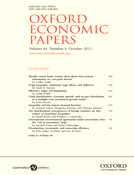
OXFORD ECONOMIC PAPERS-NEW SERIES
Fostering critical dialogue in the world of economics.OXFORD ECONOMIC PAPERS-NEW SERIES is a prestigious academic journal published by Oxford University Press, dedicated to advancing the field of economics and econometrics. With an ISSN of 0030-7653 and an E-ISSN of 1464-3812, this journal has a rich history since its inception in 1938, and continues to play a vital role in disseminating impactful research through its convergence of years spanning from 1938 to 2024. Recognized as a Q2 journal in the 2023 category of Economics and Econometrics, it ranks #396 among 716 in its field according to Scopus, reflecting a commendable position within the academic community, particularly in global economic discussions. While the journal currently does not offer open access options, it remains committed to providing a platform for rigorous research and critical discourse. Researchers, professionals, and students will find the journal's articles to be essential reading, offering insights that are pivotal for understanding economic trends, policies, and methodologies. Its focus on high-quality scholarship ensures that contributions are both theoretically robust and practically relevant, making it a significant resource in the ever-evolving landscape of economic research.

CAMBRIDGE JOURNAL OF ECONOMICS
Connecting Theory and Policy in EconomicsCambridge Journal of Economics, published by Oxford University Press, is a premier academic journal in the field of economic theory, policy, and applications, catering to researchers, professionals, and students alike. With a rich history dating back to 1977, this journal has established itself as a notable contributor to critical discourse in the arena of Economics and Econometrics. With an impressive Scopus ranking of #210 out of 716 in its category, placing it in the 70th percentile, the journal maintains a solid Q2 classification, reflecting its significant impact and contribution to the field. Although it operates on a subscription basis, the Cambridge Journal of Economics is accessible through a range of academic databases and libraries, ensuring that its high-quality research reaches a wide audience. The journal aims to advance the understanding and application of economic principles, making it an essential resource for anyone looking to deepen their knowledge or stay updated with the latest research trends in economics.
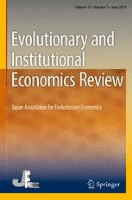
Evolutionary and Institutional Economics Review
Unraveling the Complexities of Economic InstitutionsThe Evolutionary and Institutional Economics Review, published by SPRINGER HEIDELBERG, serves as a pivotal platform for disseminating cutting-edge research in the dynamic fields of evolutionary and institutional economics. With its ISSN 1349-4961 and E-ISSN 2188-2096, this journal emphasizes interdisciplinary approaches that explore how economic institutions evolve and impact economic performance and social welfare. Although currently not open access, it provides invaluable insights for researchers, professionals, and students keen on understanding the intricate relationships between economic systems and institutional frameworks. The journal aims to foster academic discourse that bridges theoretical perspectives and practical implications, enhancing the scholarly conversation within the economic community. Its headquarters in Heidelberg, Germany, positions it at the heart of European economic research, making it an essential resource for anyone interested in the evolution of economic thought.

B E Journal of Economic Analysis & Policy
Exploring Innovative Research in Economic PolicyB E Journal of Economic Analysis & Policy, published by Walter de Gruyter GmbH in Germany, stands as a pivotal resource in the field of economics and econometrics since its establishment in 2001. Boasting an ISSN of 2194-6108 and an E-ISSN of 1935-1682, this journal is committed to advancing the understanding of economic policies and their analysis through rigorous, peer-reviewed research. With an impressive categorization that includes a Q2 ranking in the Economics, Econometrics and Finance (miscellaneous) category and a Q3 ranking in other economics niches as of 2023, it emphasizes the importance of empirical research and robust theoretical frameworks. The journal is indexed in Scopus, reaffirming its credibility, with ranks in the 49th and 32nd percentiles for its respective categories. Researchers, professionals, and students alike will find valuable insights and innovative perspectives within its pages, as it continues to shape discussions around economic policy in an ever-evolving global landscape.
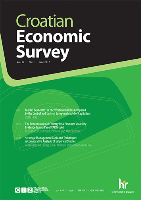
Croatian Economic Survey
Navigating Economic Challenges with Scholarly PrecisionThe Croatian Economic Survey, published by INST ECONOMICS, ZAGREB, is a pivotal platform for research in the field of economics and econometrics, serving as an influential resource for scholars and practitioners alike. Since its inception in 1994, this Open Access journal has fostered widespread dissemination of knowledge, enabling a diverse audience to access high-quality research without barriers. While currently positioned in Quartile 4 across various economics categories within the Scopus rankings, the journal continuously seeks to enhance its academic reach and impact. The Croatian Economic Survey addresses a variety of topics pertinent to economic development and policy, making it an essential reference for researchers, students, and professionals interested in the dynamic challenges faced by economies, particularly in the context of the European and global landscape. Situated in Zagreb, Croatia, it provides a unique perspective that is vital for understanding regional economic issues while contributing to the broader discourse in economics.